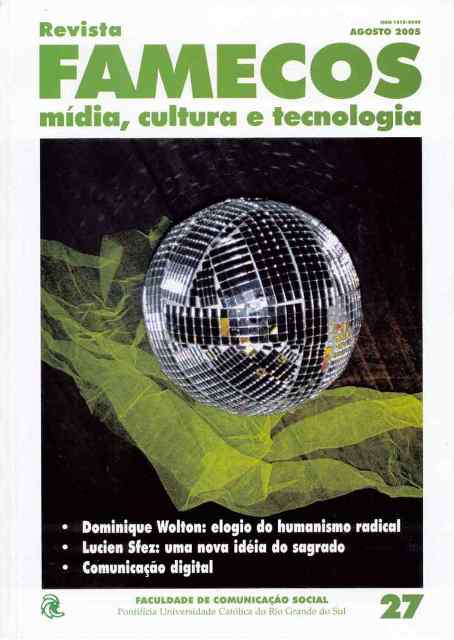Internet e participação política em sociedades democráticas
DOI:
https://doi.org/10.15448/1980-3729.2005.27.3323Palabras clave:
Participação política, internet, comunicação políticaResumen
O artigo trata do tema da participação política na literatura recente sobre os efeitos políticos da Internet. O seu propósito é examinar a tese segundo a qual a internet constitui um ambiente de comunicação que tenderia a transformar o padrão atual de baixa participação política por parte da esfera civil nas democracias contemporâneas.Descargas
Citas
ALBUQUERQUE, A.; SÁ, S. A tragédia dos ursos na China e outras mensagens: observações sobre e-política e globalização In: FAUSTO NETO, A. (Org.) Práticas mediáticas e espaço público. Porto Alegre: Editora da PUC/RS, p. 143-181, 2001.
BARBER, B. Strong Democracy: participatory politics for a new age. Berkeley: University of California Press, 1984.
BARNETT, S. New Media, Old Problems: new technology and the political process. European Journal of Communication, v. 12, n. 2, p. 193–218, 1997.
BERELSON, B. Democratic Theory and Public Opinion. Public Opinion Quarterly, v. 16, n. 3, p. 313–30, 1952.
BLUMLER, J.G.; GUREVITCH, M. The Crisis of Public Communication. London: Routledge, 1995.
BUCHSTEIN, H. Bytes that Bite: The Internet and Deliberative Democracy. Constellations, v. 4, n. 2, p. 248-263, 1997.
BUCY, E. P.; D’ANGELO, P. The Crisis of Political Communication: Normative Critiques of News and Democratic Processes. Communication Yearbook, v. 22, p. 301–39, 1999.
BUCY, E. P.; GREGSON, K. S. Media participation: A legitimizing mechanism of mass democracy. New Media & Society, v. 3, n. 3, p. 357–380, 2000.
CARLSON, T.; DJUPSUND, G. Old Wine in New Bottles? The 1999 Finnish Election Campaign on the Internet. Harvard International Journal of Press Politics, v. 6, n. 1, p. 68-87, 2001.
CHOUCRI, N. CyberPolitics in International Relations. International Political Science Review, v. 21, n. 3, p. 243–263, 2000.
COBB, R.W.; ELDER, C.D. Participation in American politics: The dynamics of Agenda-Building, 2a. ed. Baltimore, MD: Johns Hopkins University Press, 1983.
COOMBS, W.T.; CUTBIRTH, C.W. Mediated political communication, the Internet, and the new knowledge elites: prospects and portents. Telematics and Informatics, v. 15, p. 203-217, 1998.
CONWAY, M. M. Political Participation in the United States. Washington, DC: CQ Press, 2000.
CURRAN, J. Mass Media and Democracy: A Reappraisal. In: CURRAN, J.; GUREVITCH, M. (Org.) Mass Media and Society. London: Edward Arnold, p. 82–117, 1991.
DAHLBERG, L. Democracy via Cyberspace. New Media & Society, v. 3,
n. 2, p. 157–177, 2001.
DAHLGREN, P. The Public Sphere and the Net. In: BENNETT, W. L. e ENTMAN, R. M. (Org.) Mediated Politics: Communication in the Future of Democracy. Cambridge: Cambridge University Press, p. 33-55, 2001.
DEAN, J. Why the Net is not a Public Sphere. Constellations, v. 10, n. 1, p. 95-112, 2003.
DOWNEY, J.; FENTON, N. New Media, Counter Publicity and the Public Sphere. New Media & Society, v. 5, n. 2, p. 95-112, 2003.
ENTMAN, R. M. Democracy without Citizens: Media and the Decay of American Politics. Oxford: Oxford University Press, 1989.
GIBSON, R. Elections Online: Assessing Internet Voting in Light of the Arizona Democratic Primary. Political Science Quarterly, v. 116, n. 4, p. 561-583, 2001.
GIMMLER, A. Deliberative Democracy, the Public Sphere and the Internet. Philosophy & Social Criticism, n. 27, v. 4, p.21–39, 2001.
GOMES, W. Internet, Censura e Liberdade. In: PAIVA, R. (Org.) Ética, Cidadania e Imprensa. Rio de Janeiro: Mauad, p. 133-164, 2002.
_____. Transformações da política na era da comunicação de massa. São Paulo: Paulus, 2004.
HELD, D. Models of democracy. Stanford: Stanford University Press, 1987.
HACKER, K.L. Missing Links in the Evolution of Electronic Democratization. Media, Culture & Society, v. 18, n. 2, p. 213-232, 1996.
HAMLETT, P. W. Technology Theory and Deliberative Democracy. Science, Technology, & Human Values, v. 28, n. 1, p. 112-150, 2003.
JAMIESON, K. H. Dirty Politics: Deception, Distraction, and Democracy. Oxford: Oxford University Press, 1992.
JENSEN, J.L. Public Spheres on the Internet: Anarchic or Government-Sponsored - A Comparison. Scandinavian Political Studies, v. 26, n. 4, p. 349-374, 2003.
KALLIO, K.; KÄKÖNEN, J. (2002) Internet in improving democracy? Some critical remarks. Trabalho apresentado no Euricom colloquium: Electronic networks and democratic engagement, Nijmegen, 2002. Disponível em: http://baserv.uci.kun.nl/~jankow/Euricom/abstracts/N%20Kallio%20&%20Kakonen.htm. Acesso em: 26 out. 2006.
MAIA, R. Redes cívicas e internet: do ambiente informativo denso às condições da deliberação pública. In: EISENBERG, J.; CEPIK, M. (Org.) Internet e política: Teorias da democracia eletrônica. Belo Horizonte: Editora da UFMG, p. 46-72, 2002.
MILBRATH, L.W. Political Participation: How and why do People get involved in Politics? Chicago: Rand McNally, 1965.
NEUMAN, W.R. The Paradox of Mass Politics: Knowledge and Opinion in the American Electorate. Cambridge, MA: Harvard University Press, 1986.
PATTERSON, T. Out of Order. New York: Vintage Books, 1994.
POSTMAN, N. Amusing Ourselves to Death: Public Discourse in the Age of Show Business. New York: Penguin Books, 1985.
SCHUDSON, M. The Good Citizen: A History of American Civic Life. New York: Free Press, 1998.
VERBA, S.; SCHLOZMAN, K. L.; BRADY, H. E. Voice and Equality: Civic Volunteerism in American Politics. Cambridge, MA: Harvard University Press, 1995.
WILHELM, A. G. Democracy in the Digital Age: Challenges to Political Life in Cyberspace. New York, Routledge, 2000.
YENGAR, S.; KINDER, D. R. News that Mathers: Television and American Opinion. Chicago: The University of Chicago Press, 1987.
Descargas
Publicado
Cómo citar
Número
Sección
Licencia
Derechos de Autor
La sumisión de originales para la Revista Famecos implica la transferencia, por los autores, de los derechos de publicación. El copyright de los artículos de esta revista es el autor, junto con los derechos de la revista a la primera publicación. Los autores sólo podrán utilizar los mismos resultados en otras publicaciones indicando claramente a Revista Famecos como el medio de la publicación original.
Creative Commons License
Excepto donde especificado de modo diferente, se aplican a la materia publicada en este periódico los términos de una licencia Creative Commons Atribución 4.0 Internacional, que permite el uso irrestricto, la distribución y la reproducción en cualquier medio siempre y cuando la publicación original sea correctamente citada.






